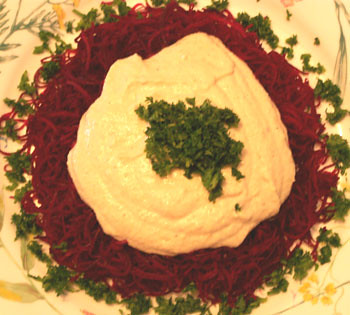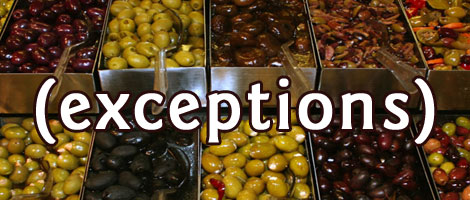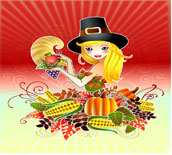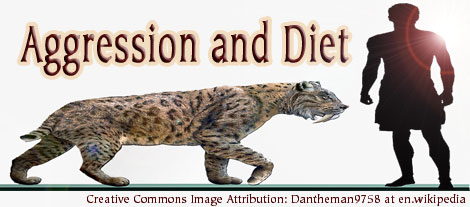
Getting Lyme Disease after regaining my health on the raw foods diet was a tough thing to accept. How could a body cure itself with a raw food diet, yet then fail to even recognize and destroy the Lyme bacteria? So many individuals have recovered from awful diseases, including cancer, by eating a raw food diet. Why, as a raw foodist, has my body been unable to easily eliminate this lyme disease?
I know Jim and I weren't the only ones wondering this. Many of you have voiced concerns, as well. Questions have been asked about how healthy my raw diet has actually been. Have I been cheating and eating cooked foods? Have I been eating too many packaged raw food snacks? Am I drinking alcohol? What have I been doing *wrong* with my diet in order for this to happen in my body? Here are some answers:
Read more: Please Share Immune Building Knowledge with Wendi!

Yesterday we talked about attending raw food meetups / potlucks. Today we'll focus on...
*Hosting* Raw Foods Meetups
There are two main ways to host a raw foods meetup. The first would be through the meetup.com web site. If there is no raw foods meetup in your area, you're going to need to launch one. (See the Meetup web site for details.) If there is a group, you'll need to sign up and get to know the moderator, as you'll need to announce your meetup through that person.
Read more: Raw Meetups: What to Bring, How to Host Them (Part 2)

The mono meals ended and I did create that beet pasta with alfredo sauce that I was dreaming about. So, here's the recipe:
BEET PASTA

Jim here... We know a lot of people who exist on a high-raw lifestyle, and many others who aspire to eat a 100% live food diet. I don't believe there is an exact threshold that makes one a "raw foodist." That term is more or less just a general description you might use about yourself or anyone. Aside from the labels, though... If you want to talk about recommended levels of raw intake for optimal health, quite a number of web sites and health books seem to recommend shooting for around 80% of one's intake to be raw, with a careful eye on the other 20%. We certainly agree with that as a good starting goal, adjusting upward or downward as you gain feedback from your body.
Of course, most of the people who do follow a high-raw diet are usually by definition highly health-conscious about any non-raw foods they eat. I've yet to meet, for example, a raw foodist who occasionally eats Burger King Double-Whoppers ?(although, I'm sure that seemingly odd combination must exist somewhere).
Hi all-? Jim here from Pure Jeevan with our next eipsode of "Know Your Food."? This is "Episode 2 (salvaged): Turnips."? As far as that "salvaged" parenthetical... This relates to the story I told in our first episode -- about how we're planning to upgrade our video equipment, audio equipment, video editing software, and more. I hope you like it, though. Still working on getting them down to 3-4 minutes. This one's just over 5 minutes. If you're wondering how Wendi became strong as Xena Warrior Princess, you'll have to watch this vid!
So, to summarize:? Turnips are great for the root portion (the turnips, proper) or the greens. (Here at Pure Jeevan, we like to use turnips as shells for rawvioli, or simply sliced and served with a little salt. The greens are great juiced!)? Turnips are starchy, but not as heavy as potatoes, and are a great Vitamin C source. They contain fiber, manganese, pantothenic acid, thiamine, potassium, folic acid, copper, niacin, B6, E, riboflavin, and more. The greens of course have calcium, and are a particularly great source of folate (esp. important for pregnant women) and many of the vitamins and minerals listed previously, along with Vitamin A.
Jim here... Thought I'd cross-post a discussion I put up on Give It To Me Raw yesterday.

Recently, I saw an article advocating a ban on banana consumption based on the premise that, if you don't live in the tropics, you have no business eating tropical fruit. Pointing to transportation costs and the related environmental impact of such transportation, the article argues that, by eating bananas, you're contributing to the destruction of the environment.

For some odd reason, I've had the privilege of "doing Thanksgiving" with a lot of different friends and families over the years. Because of this, and of course just from talking with others and reading things others have posted, I'm fairly certain that Thanksgiving means different things to different people.For some, it's their favorite annual holiday and fills them with joyous memories of Thanksgivings past and incredible anticipation of Thanksgivings to come. Some historian friends of mine seem fascinated by the historical aspects of the holiday -- the whole story of the pilgrims, etc. On the other end of the spectrum, I've actually encountered a few people who take offense at the very idea of this holiday (and they've got some convincing reasons to protest the wider celebrations)!
 While all holidays are certainly "food-centric" by tradition, it's arguable that no other holiday (at least here in America) can match Thanksgiving's reputation in terms of feasting. It's kind of funny when you think about it because many holidays (or, "holy days") are actually traditionally observed by abstaining from food. So, there are fasts, and feasts. I think the majority view, based on my own sampling of various friend and family traditions, seems to be: It's mostly about having a huge meal. Yes, there is certainly an undercurrent of being thankful out there. A few families I've been with have had traditional, almost ceremonial, activities that went along with the meal (e.g., going around the room, taking turns stating what you're grateful for).
While all holidays are certainly "food-centric" by tradition, it's arguable that no other holiday (at least here in America) can match Thanksgiving's reputation in terms of feasting. It's kind of funny when you think about it because many holidays (or, "holy days") are actually traditionally observed by abstaining from food. So, there are fasts, and feasts. I think the majority view, based on my own sampling of various friend and family traditions, seems to be: It's mostly about having a huge meal. Yes, there is certainly an undercurrent of being thankful out there. A few families I've been with have had traditional, almost ceremonial, activities that went along with the meal (e.g., going around the room, taking turns stating what you're grateful for).

"... a warrior's life is not about imagined perfection or victory; it is about love. Love is a warrior's sword; wherever it cuts, it gives life, not death."
~ Dan Millman, The Way of the Peaceful Warrior
During some "highway philosophization" (my term for pondering everything and anything while driving) this afternoon, I eventually began to think rather deeply about human aggression, and specifically about how people hurt other people. Mainly, I was thinking about individual aggreession, although, as a group, humans are unfortunately rather prone to it.Wikipedia maintains a list of ongoing conflicts (i.e., wars), in fact. According to that page, there are seven major wars happenning right now and 15 additional significant ones. Of course, there are scores of unlisted ones ongoing as well, most of which the average person has never heard about.

On August 31st, my project will be finished enough to present it as a
GIFT TO THE ENTIRE RAW COMMUNITY!?
Today we talk about ways to lessen one's chances of developing dementia, aside from dietary changes. Other than eliminating foods from our diet that may hinder brain function, or adding foods that enhance brain function, what can we do to keep our minds sharp as we age?
The first action step you can take to keep your mind healthy is to physically exercise the rest of the body. By keeping our limbs and muscles active, we are not only enhancing the flow of oxygen throughout our bodies, we're continually working our brains, as well. Every move you make requires a message from your brain to be sent to your muscles. So, the more you move, the more you're exercising that part of your brain.

Jim here... Whenever I want to learn how to do something new, here's how I go about it:
>>> I practice. <<<
